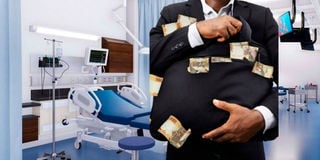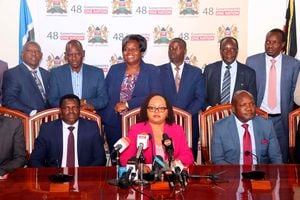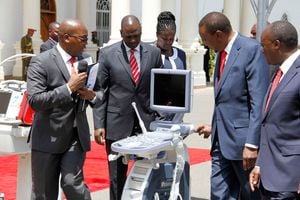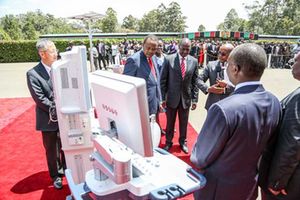
Mystery medical equipment suppliers will reap billions as their leasing fees will consume most of the money paid by the Social Health Authority on behalf of thousands of patients.
Counties have signed multi-billion-shilling deals with the Health ministry for the lease of medical equipment from mystery suppliers, even as the cost and revenue sharing formula threatens to sink health facilities owned by the devolved units.
Under the National Equipment Service Project, suppliers will lease the medical equipment to county-owned facilities.
The NESP is successor to the controversial Medical Equipment Service (MES), which saw Kenyans part with Sh63 billion in deals that remain shrouded in secrecy to date.
While the Health ministry has for months promised better handling of leasing deals under the NESP, the project has picked of where the MES left off in regard to secrecy of its workings and contributing to higher costs for healthcare.
Documents seen by the Nation show that the mystery suppliers will reap billions almost instantly, as their leasing fees will consume most of the money paid by the Social Health Authority (SHA) on behalf of thousands of patients.
County-owned facilities
Under the National Equipment Service Project (NESP), the mystery supplier will avail an assortment of machines and equipment to county-owned facilities, and will be paid directly from SHA.
The proposed payment plan by the Health ministry has seen some health facilities threaten to increase cost of services stemming from equipment sourced under the NESP.
At least 37 counties have already signed agreements with the Health ministry which will allow the devolved units lease equipment from a vendor sourced by Afya House.
Health CS Deborah Mlongo Barasa and Medical Services PS Harry Kimtai did not respond to our calls and text messages to their known phone numbers, seeking details on the vendors, how they were sourced and the payment schedule which is skewed in favour of suppliers and at the expense of health facilities.
Mr Kimtai is yet to respond to an email sent to his official address last Friday.
Endebess MP Robert Pukose, who chairs the National Assembly’s departmental committee on health, said that there is no confirmed vendor yet, but he held that lawmakers will viciously oppose the proposed payment plan which could bankrupt some institutions.
“That (payment schedule proposed by Health ministry) is a rip-off and I don’t think that we (committee on health) will allow SHA to do that kind of thing. People need to be careful with what they are doing. We will not allow anyone to create a scandal out of it (NESP),” Mr Pukose said, adding that the NESP finer details are yet to get to the floor of Parliament.
In October, while still facing impeachment, former Deputy President Rigathi Gachagua claimed in a joint media interview that one businessman could become a monopoly in the project by getting a majority of the supply deals up for grabs.
Mr Gachagua did not, however, mention the businessman by name or which company he is associated with.
Despite footing the bill through SHA, county chiefs and their facilities are still in the dark over who will supply the equipment in the multibillion-shilling deal.
Two governors yesterday confirmed that none of the county chiefs know who the vendor is, as they only signed agreements with the Health ministry to avail the equipment.
“There are two types of commitment that we have done, and neither was vendor disclosed; 1. A general commitment that we are interested in the placement. CEC health did sign with many other CECs from various counties. 2. Types of machines Murang’a needs. That is undergoing analysis and will be shared with the ministry,” Muranga governor Irungu Kangata said.
“First was the IPA (Intergovernmental Participation Agreement). Second was the list to be sent to Council of Governors of needs. Third is to plan what to pick based on need and the sharing agreement formula. The contract and schedule don’t have the name(s) of contractors. We will pick when it is necessary and after due consideration and assessment,” Makueni Governor Mutula Kilonzo Jr said.
The schedule Mr Kilonzo referenced shows how county-owned health facilities and the mystery supplier will share revenue remitted by SHA on behalf of insured patients.
The schedule indicates that the vendor’s leasing fees will be docked from the service fees charged by health facilities, and will be paid directly for SHA.
In most cases, the vendor will get between 60 per cent and 80 per cent of the funds released by SHA for treatment of patients.
For instance, a patient seeking hemodialysis is covered by SHA up to Sh10,560. After treatment, SHA will send Sh8,660 or 82 per cent of the service cost directly to the equipment supplier, with the hospital retaining only Sh1,990 or 18 per cent.
Health facilities may be left in debt for some procedures, as the revenue sharing document shows that the vendor will get more money than the cost of service.
For instance, repairing a Posterior Cruciate Ligament (PCL) or Anterior Crucial Ligament (ACL) injury, common in accidents and sports, will be covered by SHA up to Sh280,000.
The vendor will get Sh345,709 – more than the SHA cover. Still, the document shows that the hospital will receive Sh65,709.
Patients seeking Bentall’s procedure – replacing the aortic valve, root and ascending aorta with a graft – SHA will cover them up to Sh1,008,000. But the vendor will receive Sh760,480 or 75 per cent, as the hospital retains Sh247,520 or 25 per cent of the service fee levied to the patient.
Those who need unblocking of clogged arteries through balloon angioplasty are covered up to Sh145,600 by SHA. The equipment vendor will get Sh137,592 to the vendor and Sh8,008 to the health facility.
Increase cost of service
An official in a county-owned hospital said that the facility he works in has already resolved to increase cost of service.
“We also have to pay staff and handle other administrative costs. With that formula, there will be a huge revenue shortfall so the only thing to do is to increase the cost of affected services,” he said last Wednesday.
The intergovernmental participation agreement signed by counties indicates that some of the equipment will be provided on a lease-to-own basis.
The equipment to be leased will cover imaging services like x-rays and MRIs, laboratory services, cardiology, urology, ear, nose and throat services, ophthalmology, nuclear medicine, oncology, gynecology, obstetrics and others.












